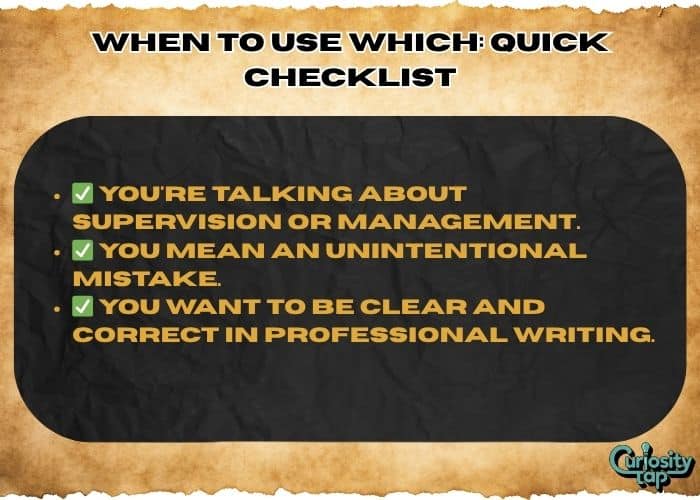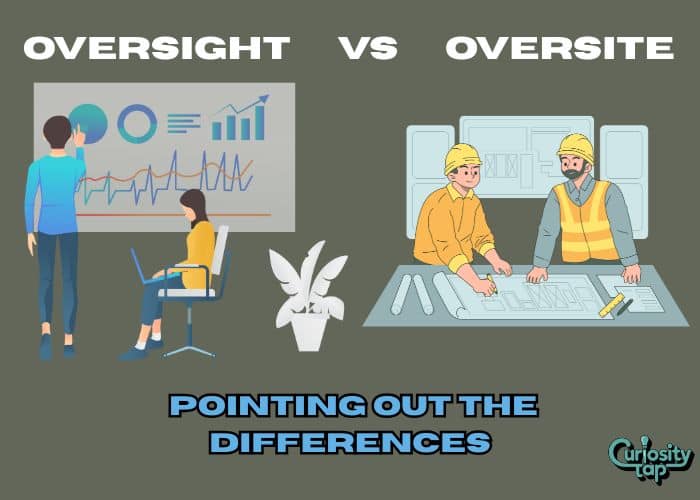Mistaking oversight for oversite might seem minor until it costs clarity in your writing or credibility in your work. These two similar-looking words are often confused, especially in professional settings.
But make no mistake: one is commonly used across industries, and the other is a niche term reserved for specific fields.
If you’re a student, editor, business professional, or curious writer wondering which term is correct in which context, this guide will clear up the confusion for good.
What Is the Primary Difference Between Oversight and Oversite
At a glance, oversight and oversite may seem interchangeable. But in truth, only one is widely accepted and recognized in most dictionaries.
1. Oversight: The Mainstream and Multifaceted Term
Oversight is the correct and commonly accepted term in standard English. It has two meanings, and they’re essentially opposite making it a classic case of a contronym.
- Meaning 1 (Supervision): The act of overseeing, managing, or monitoring a task or organization.
- Meaning 2 (Error): A mistake caused by inattention or something being unintentionally overlooked.
✅ Example:
“The oversight committee is responsible for monitoring project compliance.”
✅ Example:
“Leaving that line of code was an unfortunate oversight.”
2. Oversite: Rare, Technical, and Field-Specific
Oversite is a much rarer word. It appears primarily in architecture and construction, usually referring to the groundwork or slab that supports a building. It’s not used in general contexts and is considered archaic or industry jargon.
✅ Example (Construction context):
“The engineer examined the oversite to ensure the foundation was properly laid.”
🔍 According to the Collins English Dictionary and Oxford Reference, oversite is seldom used outside the UK and in technical manuals.
Also Read: Totalling or Totaling: Which Spelling is Correct?
Real-Life Usage: Oversight Gone Wrong
A project manager once submitted a compliance report stating:
“Our team was under the constant oversite of the board.”
The email raised eyebrows was this a spelling error, or a technical term no one else understood? Turns out, the writer meant oversight (supervision), but the incorrect use of oversite confused stakeholders and hinted at poor attention to detail.
This example proves that one simple word misuse can damage professional credibility even when the message itself is solid.
Side-by-Side Comparison Table
| Term | Meaning | Usage Context | Dictionary Recognized | Common? |
|---|---|---|---|---|
| Oversight | Supervision or unintentional error | Business, government, general writing | ✅ Yes (Merriam-Webster, Oxford) | ✅ Very common |
| Oversite | Foundation slab or groundwork | Construction, architecture | ⚠️ Rare or UK technical | ❌ Rare |

When to Use Which: Quick Checklist
Use Oversight if:
- ✅ You’re talking about supervision or management.
- ✅ You mean an unintentional mistake.
- ✅ You want to be clear and correct in professional writing.
Use Oversite only if:
- 🏗️ You’re working in construction or referring to foundation layers in UK English.
Why the Confusion Exists
1. Phonetic Similarity
Both words sound the same when spoken, leading to spelling confusion in written texts.
2. Spellcheck Limitations
Some spellcheck tools don’t flag “oversite” as incorrect even though it may be contextually wrong.
📊 A 2023 Grammarly report found that homophone errors account for 18% of professional writing mistakes (Grammarly Insights, 2023).
Pros and Cons of Using Each Term
| Term | Pros | Cons |
|---|---|---|
| Oversight | Clear, correct, versatile in meaning | Double meaning can sometimes cause ambiguity |
| Oversite | Accurate for specific construction contexts | Often mistaken, rarely understood outside industry |
FAQs: Oversight vs Oversite
1. Is “oversite” ever acceptable in formal writing?
Only in technical or architectural texts where it refers to construction groundwork.
2. Why do people use “oversite” by mistake?
It sounds identical to “oversight” and may not be flagged as a spelling error.
3. Is “oversight” a positive or negative word?
It depends on context: it can mean supervision (positive) or a mistake (negative).
4. Can you pluralize these words?
Yes. “Oversights” is common. “Oversites” is rare but possible in technical writing.
5. Is “oversite” British English?
It appears more in British English technical contexts but isn’t widely used.
6. Are there synonyms for “oversight”?
Yes: supervision, monitoring, management, error, or omission depending on meaning.
Conclusion: Master the Word, Avoid the Mistake
Don’t let a minor spelling issue make a major impression. The difference between oversight and oversite isn’t just grammatical it’s contextual. Use oversight for general purposes and professional writing. Use oversite only if you’re laying concrete or writing a technical manual.
Sources List
Sources:
- Collins English Dictionary. (2024). Oversite. https://www.collinsdictionary.com/dictionary/english/oversite
- Merriam-Webster Dictionary. (2024). Oversight. https://www.merriam-webster.com/dictionary/oversight
- Grammarly Business Insights. (2023). Common Writing Mistakes Report. https://www.grammarly.com/business
Read more knowledgeable blogs on Curiosity Tap
Is this article helpful?

Jackson Pearson is a passionate educator and language enthusiast behind the blog Jackson Pearson. With years of experience in teaching and writing, he specializes in simplifying complex grammar rules, breaking down tricky vocabulary, and crafting learning guides that are both engaging and practical. His mission is to help readers boost their English skills whether they’re beginners or brushing up for fluency. Through every article, Jackson brings clarity, structure, and a spark of curiosity to the world of English learning.



